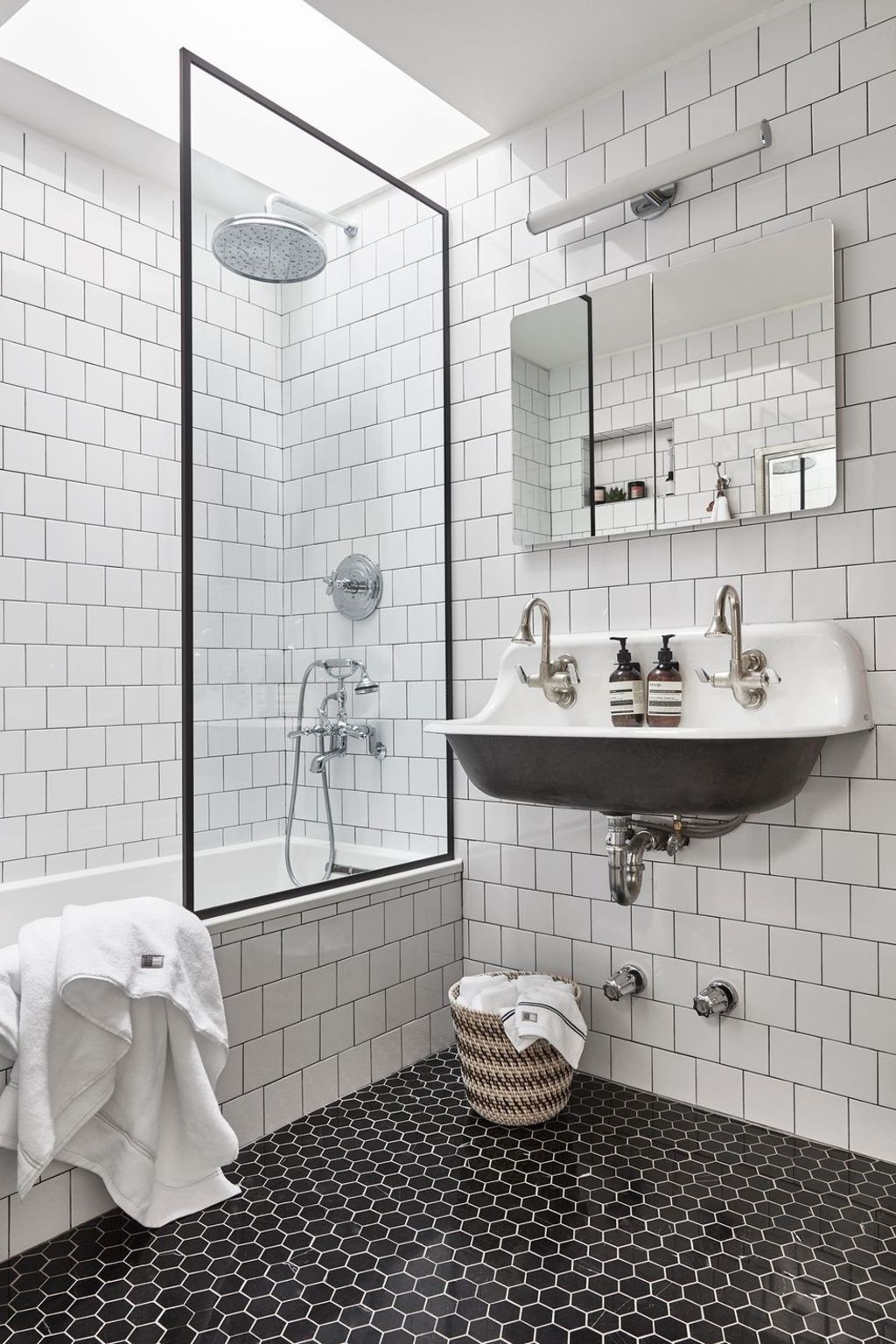Tired of your outdated bathroom? Dreaming of a spa-like escape? Upgrading your shower floor can make all the difference! From classic tiles to trendy materials, there are countless ways to add a touch of luxury to your daily routine. We’ll help you choose the perfect shower floor for your style and budget, so let’s dive in!
Shower Floor Materials: Finding the Perfect Fit
What Materials Can I Use?
The good news is that you have a wealth of options! Here are a few popular choices to get you started:
- Tile (Ceramic or Porcelain): Tile is incredibly versatile, available in a vast array of colors, patterns, and styles – it can even mimic the look of pricier materials like wood. Plus, it’s generally a budget-friendly option.
- Natural Stone (Marble, Granite, Slate): Nothing says luxury like natural stone. Each piece is unique, with natural veining and color variations that add character to your shower. Keep in mind that natural stone can be more expensive and may require a bit more maintenance.
- Pebble Stone: For a spa-like feel, pebble stone is an excellent choice. It brings a touch of nature into your shower and provides a naturally slip-resistant surface.
Get Creative with Design!
Now for the fun part – designing your dream shower floor!
- Patterns: Don’t be afraid to play with patterns! Herringbone, mosaic, geometric – the possibilities are endless. You can even create your own custom design for a truly unique look.
- Colors & Textures: Consider the overall mood you want to create in your bathroom. Neutral tones are calming and serene, while bold colors add energy and a modern vibe. Texture can also play a key role, adding visual interest and enhancing slip resistance.
- Layout & Size: The size and layout of your tiles can have a big impact on the overall feel of your shower. Large format tiles can make a small shower feel more spacious, while smaller tiles are perfect for intricate designs. For a sleek and modern touch, consider a linear drain.
Choosing the Right Shower Floor for You
Before you fall in love with a specific material or design, consider these important factors:
- Lifestyle: Showers get wet and messy! If you have a busy household with kids or pets, durability and ease of cleaning should be top priorities.
- Budget: Setting a realistic budget from the start is essential to avoid overspending. Your dream shower floor should be beautiful and affordable.
- Safety First: A slip-and-fall in the shower is the last thing anyone wants. Look for slip-resistant surfaces, especially if you have young children or older adults in your home.
Thinking Beyond the Basics
Here are a few additional tips to keep in mind:
- Accessibility: If you plan on staying in your home long-term, consider incorporating accessible design elements into your shower from the start. This may include a curbless entry, wider doorways, grab bars, and slip-resistant flooring.
- Sustainability: Style and sustainability can go hand-in-hand. Look for eco-friendly options like recycled glass tiles or responsibly sourced natural stone.
- Maintenance & Care: No matter what material you choose, proper care is essential to keep your shower floor looking its best. Ask your contractor or supplier for specific cleaning and maintenance recommendations.
Designing your dream shower floor should be an enjoyable and exciting experience. With so many options available, you’re sure to find the perfect combination of style, functionality, and budget to create a shower you’ll love for years to come!
What is the Best Material for a Shower Floor?
Choosing the best material for your shower floor is a crucial step in your bathroom renovation. The ideal material should be durable enough to withstand daily use, complement your style, and fit within your budget. Let’s delve into the pros and cons of some popular options:
Tile (Ceramic, Porcelain, Glass)
Pros:
- Versatility: Tile comes in a vast array of colors, patterns, sizes, and finishes, making it easy to match any bathroom style.
- Affordability: Ceramic tile is generally budget-friendly, making it a popular choice for homeowners.
- DIY-Friendly (Sometimes): Depending on the complexity of the design, tiling can be a manageable DIY project. However, intricate patterns or large-format tiles may require professional installation.
Cons:
- Grout Maintenance: The grout lines between tiles can be prone to staining and mildew growth, requiring regular cleaning and maintenance.
- Slip Hazard: Smooth tiles can be slippery when wet. Opting for textured tiles or smaller mosaic tiles can help increase traction.
Natural Stone (Slate, Marble, Granite)
Pros:
- Luxury: Natural stone instantly elevates the look and feel of your shower, creating a spa-like ambiance.
- Natural Variation: Each piece of natural stone is unique, with natural veining and color variations that add character.
- Durability: Natural stone is incredibly durable and, with proper care, can last for decades.
Cons:
- Cost: Natural stone is typically more expensive than tile or other flooring options.
- Porosity: Natural stone is porous and requires regular sealing to prevent staining and water damage.
- Installation: Installing natural stone can be tricky and often requires a professional, which can add to the overall cost.
Solid Surface Materials (Acrylic, Stone Resin)
Pros:
- Seamless Appearance: Solid surface materials are installed in one piece, eliminating grout lines and creating a sleek, modern look.
- Easy Cleaning: With no grout lines to scrub, solid surface materials are incredibly easy to clean and maintain.
- Design Flexibility: Solid surface shower floors can be customized with a wide range of colors, patterns, and integrated drain designs.
Cons:
- Scratching: While durable, solid surface materials can be susceptible to scratching or denting (though many are repairable).
- Discoloration: Some solid surface materials may fade or discolor over time, especially with prolonged exposure to direct sunlight.
- Cost: Solid surface materials are typically more expensive than tile.
Choosing Your Shower Floor Champion
The best material for your shower floor depends on your personal needs, style preferences, and budget. Consider these factors when making your decision:
- Budget: Determine your budget range early on to narrow your options.
- Lifestyle: Be honest about your cleaning habits and choose a material that fits your lifestyle.
- Style: Select a material that complements your bathroom’s overall aesthetic.
- DIY vs. Pro: Consider your skill level when it comes to installation. Some materials, like tile, may be suitable for DIY projects, while others, like natural stone, often require professional installation.
Remember, a well-installed and properly maintained shower floor is key to a long-lasting and enjoyable shower experience. If you have any doubts or questions, it’s always best to consult with a qualified professional.
What is the Best Flooring for a Bathroom Shower?
Choosing the right flooring for your bathroom shower is crucial for both aesthetics and practicality. It’s got to be durable enough to withstand daily use, resistant to water damage, and, of course, look fantastic. With so many options available, it’s easy to feel overwhelmed. Let’s break down some popular choices and their key considerations:
Things to Keep in Mind:
- Durability: How much foot traffic will your shower floor receive? Is it a busy family bathroom or a rarely used guest shower?
- Maintenance: Consider your cleaning habits. Are you willing to put in the extra effort to maintain a high-maintenance material?
- Slip Resistance: Safety is paramount, especially in a wet environment like a shower. Prioritize slip-resistant materials, particularly if you have children or older adults in your home.
- Style: Your shower floor should complement your bathroom’s overall design aesthetic, whether it’s modern, traditional, rustic, or spa-like.
Shower Flooring Options:
1. Tile (Ceramic, Porcelain):
- Pros: Durable, water-resistant, affordable, wide variety of styles and colors available.
- Cons: Can be slippery when wet (choose textured options), grout lines require regular cleaning.
2. Natural Stone (Marble, Granite, Slate):
- Pros: Luxurious look, durable, unique veining and patterns add character.
- Cons: Porous (requires sealing), can be expensive, potentially slippery when wet, professional installation often recommended.
3. Solid Surface Materials (Acrylic, Stone Resin):
- Pros: Seamless look (no grout lines), easy to clean, customizable colors and patterns.
- Cons: Can be prone to scratching, may discolor over time, more expensive than tile.
4. Pebble Tile:
- Pros: Natural, textured surface provides excellent grip and drainage.
- Cons: Can be more challenging to clean, uneven surface may require professional installation.
5. Vinyl Flooring:
- Pros: Budget-friendly, waterproof, available in realistic stone and tile looks.
- Cons: Less durable than other options, may not last as long.
6. Wood (Teak):
- Pros: Naturally water-resistant, warm and inviting aesthetic, adds a spa-like feel.
- Cons: Requires regular oiling and maintenance, more expensive, susceptible to mold and mildew if not properly cared for.
The Bottom Line:
The “best” shower flooring material depends entirely on your individual needs and preferences. Consider your budget, lifestyle, desired maintenance level, and the overall style of your bathroom. Don’t hesitate to browse around, gather samples, and envision each material in your space before making a decision.
What Can I Use for a Shower Floor Base?
The shower floor base provides the foundation for your shower flooring and plays a crucial role in preventing leaks and ensuring longevity. Choosing the right material is essential for both functionality and aesthetics. Let’s explore some popular options:
1. Tile (Ceramic or Porcelain):
- Pros: Durable, water-resistant, available in a wide range of styles and colors to complement any bathroom design.
- Cons: Requires grouting, which can be prone to staining and mildew if not properly maintained.
2. Natural Stone (Marble, Granite, Slate):
- Pros: Luxurious and elegant, each piece is unique, incredibly durable.
- Cons: Can be expensive, porous (requires sealing), may require professional installation.
3. Pebble Tile:
- Pros: Creates a natural, spa-like feel, excellent drainage due to the spaces between the stones.
- Cons: Can be more challenging to clean, typically requires professional installation.
4. Glass Tile:
- Pros: Modern and stylish, hygienic and stain-resistant.
- Cons: Can be slippery when wet, shows watermarks more easily, more expensive than ceramic or porcelain tile.
5. Wood (Teak, Cedar):
- Pros: Brings warmth and natural beauty to the shower, naturally water-resistant and durable when properly treated.
- Cons: Requires regular oiling and maintenance, more susceptible to water damage if not properly cared for.
Shower Base Material Comparison
| Material | Pros | Cons | Cost (Approx. per sq. ft.) |
|---|---|---|---|
| Porcelain Tile | Durable, water-resistant, versatile styles, affordable | Can be slippery (unless textured), grout requires maintenance | $5 – $30 |
| Natural Stone (Marble, Granite, Slate) | Luxurious, durable, unique patterns and veining | Porous (requires sealing), can be expensive, may require professional installation | $15 – $40+ |
| Pebble Tile | Excellent drainage, natural look and feel, slip-resistant | Can be difficult to clean, uneven surface, professional installation often required | $10 – $25 |
| Glass Tile | Hygienic, stain-resistant, modern and stylish | Can be slippery, shows watermarks easily, more expensive | $30 – $50+ |
| Wood (Teak, Cedar) | Warm, natural beauty, naturally water-resistant and durable when properly treated | Requires regular oiling and maintenance, susceptible to water damage if not properly cared for, more expensive | $20 – $40+ |
Choosing Your Shower Base:
- Style and Budget: Determine your style preferences and set a realistic budget to narrow down your options.
- Durability and Maintenance: Consider the level of foot traffic your shower will receive and your cleaning habits.
- Slip Resistance: Prioritize safety with slip-resistant materials, especially if you have young children or older adults using the shower.
- Visual Appeal: Don’t be afraid to experiment with different textures and finishes to create a shower floor that reflects your style.
Choosing a new shower floor base is an exciting step in your bathroom renovation. By carefully considering your options and consulting with qualified professionals, you can create a beautiful, functional, and long-lasting shower you’ll love for years to come!
- How to Remove Water Stains from Fabric: A Complete Guide - April 26, 2025
- How to Get Motor Oil Out of Clothes: Proven Methods & Expert Tips - April 26, 2025
- How to Get Deodorant Out of Black Shirts: Easy Stain Removal Guide - April 26, 2025










